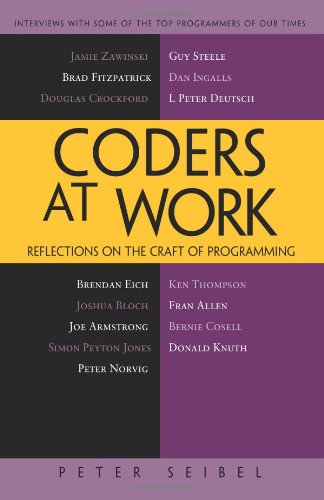Donald Knuth on Getting to the Source Material
Seibel: Do you feel like programmers and computer scientists are aware enough of the history of our field? It is, after all, a pretty short history.
Knuth: There aren't too many that are scholars. Even when I started writing my books in 1963, I didn't think people knew what had happened In 1959. I was reading in American Scientist last week about people who had rediscovered an algorithm that Boyer and Moore had discovered in 1980. Ii happens all the time that people don't realize the glorious history that we have. The idea that people knew a thing or two in the '70s Is strange to a lot of young programmers.
It's inevitable that in such a complicated field that people will be missing stuff. Hopefully with things like Wikipedia, achievements don't get forgotten the way they were before. But I wish I could also instill in more people the love that I have for reading original sources. Not just knowing that so-and-so gets credit for doing something, but looking back and seeing what that person said in his own words. I think it's a tremendous way to improve your own skills.
It's very Important to bee able to get inside of somebody else's way of thinking, to decode their vocabulary, their notation. If way they thought and the way they made a own discoveries. I often read source I materials of what brilliant people have said about this stuff in the past. It'll be expressed in unusual ways by today's convention it's worth it to me to penetrate their notation and to try to get into I their idea.
For example I spent a good deal of time at Babylonian manuscripts of how they described algorithms 4,000 years ago, and what did they think about? Did they have while loops and stuff like this? How would they describe it? And to me this is very worthwhile for understanding about how the brain works, but also about how they discovered things.
A couple of years ago I found an old Sanskrit document from the 13th century that was about combinatorial math. Almost nobody the author knew would have had the foggiest idea what he was talking about. But I found a translation of this document land it was speaking to me. I had done similar kinds of thinking when I was beginning in computer programming.
And so to me reading source materials is great enrichment for my own life and creativity.
Notes:
The joy of going to the primary documents for understanding how people throughout history thought.
Folksonomies: computer science computer science history
Taxonomies:
/science/social science/history (0.516790)
/hobbies and interests/reading (0.513665)
/business and industrial (0.406263)
Keywords:
pretty short history (0.970574 (negative:-0.488446)), so-and-so gets credit (0.897631 (negative:-0.521184)), people (0.894046 (positive:0.250977)), old Sanskrit document (0.850438 (neutral:0.000000)), Donald Knuth (0.739450 (positive:0.816257)), primary documents (0.713048 (positive:0.816257)), Material The joy (0.710330 (positive:0.816257)), tremendous way (0.687536 (positive:0.840734)), glorious history (0.685890 (negative:-0.375654)), American Scientist (0.685128 (neutral:0.000000)), complicated field (0.680479 (negative:-0.816416)), original sources (0.677486 (neutral:0.000000)), young programmers (0.676951 (neutral:0.000000)), brilliant people (0.673840 (positive:0.749405)), foggiest idea (0.669754 (negative:-0.671607)), Babylonian manuscripts (0.666842 (neutral:0.000000)), unusual ways (0.660372 (positive:0.619915)), great enrichment (0.657869 (positive:0.830274)), similar kinds (0.656289 (negative:-0.224076)), good deal (0.654912 (neutral:0.000000)), document land (0.652769 (neutral:0.000000)), 13th century (0.651438 (neutral:0.000000)), combinatorial math (0.650808 (neutral:0.000000)), source I materials (0.644538 (positive:0.749405)), source materials (0.636378 (positive:0.830274)), stuff (0.556389 (negative:-0.248136)), notation (0.514785 (positive:0.619915)), thinking (0.503269 (positive:0.266366)), things (0.499954 (positive:0.311337)), time (0.499887 (negative:-0.375654))
Entities:
Donald Knuth:Person (0.730455 (positive:0.179032)), Seibel:Person (0.431992 (neutral:0.000000)), American Scientist:PrintMedia (0.409012 (neutral:0.000000)), Wikipedia:Company (0.359846 (positive:0.311337)), Boyer:Person (0.342310 (neutral:0.000000)), Moore:Person (0.313361 (neutral:0.000000)), 4,000 years:Quantity (0.313361 (neutral:0.000000))
Concepts:
Cognition (0.971116): dbpedia | freebase | opencyc
Thought (0.969854): dbpedia | freebase | opencyc
Mind (0.910245): dbpedia | freebase | opencyc
Algorithm (0.872278): dbpedia | freebase | opencyc
Computer (0.868129): dbpedia | freebase | opencyc
Programming language (0.846139): dbpedia | freebase
Computer programming (0.779987): dbpedia | freebase
Programmer (0.755627): dbpedia | freebase | opencyc





